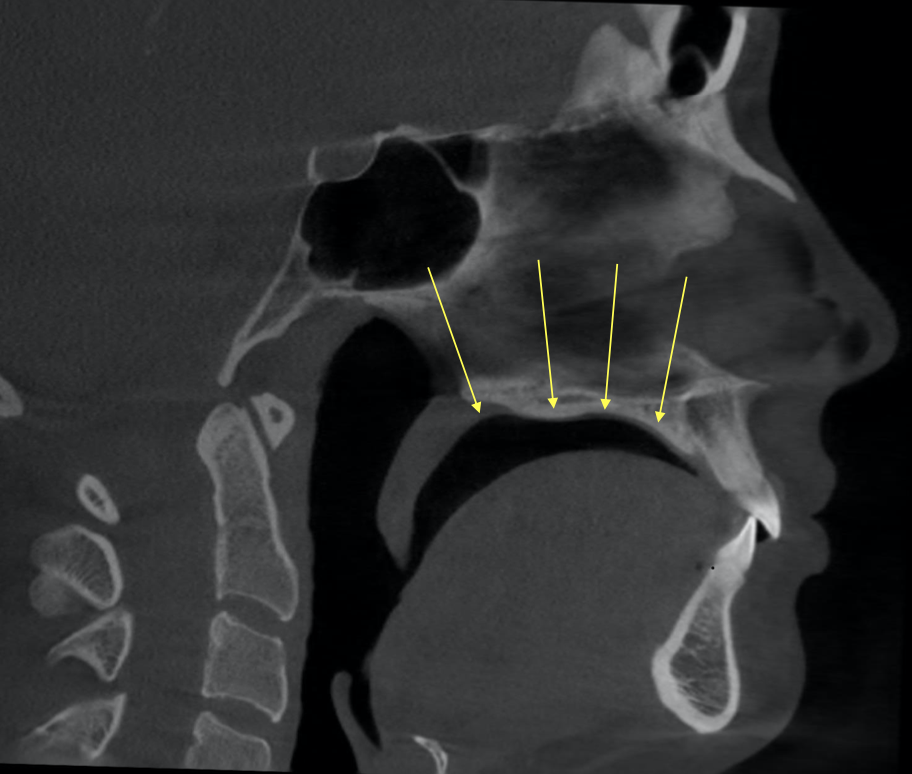
Tongue-Tie
Tongue-tie is a condition where the piece of tissue that connects the tongue to the floor of the mouth is too short, thereby restricting the tongue's range of motion. Tongue-tie can cause breastfeeding difficulties, speech impediments, and sleep apnea. A restricted tongue can additionally alter facial development. As your child grows, the tongue typically rests in the roof of the mouth, contacting the palate. Tongue-tie causes the tongue to adopt a lower resting position. The lower resting tongue position interferes with the palatal development, causing it to be abnormally high and arched. Because the roof of the mouth is the floor of the nose, a high-arched palate makes breathing through the nose difficult.
What we offer at Sleep and Brain
At Sleep and Brain, we strive to diagnose and treat a tongue-tie early in life before the damaging effects occur. Our physician will conduct a detailed history and specialized examination to determine if an underlying tongue-tie is present and contributing to your health concerns.
The detailed clinical history will, in part, include the following:
Speech issues
Hard to understand
Stuttering
Unable to speak fast
Speech delay
Trouble with sounds
Breastfeeding issues
Painful nursing
Poor latch
Losing milk out of the corner of the mouth
Gagging
Nipple damage
Plugged ducts, engorgement, and mastitis
Frequent feeding every 30 to 60 minutes
Feeding issues
Hard time transitioning to solid foods
Slow eater
Grazes on food throughout the day
Choking on food
Aversion to specific textures of foods
Unable to open the mouth widely
Poor weight gain
Sleep issues
Restless sleep
Bedwetting
Grinds teeth
Sleeps in strange positions
Snores
Reflux
Mouthbreathing
Brain issues
ADHD
Anxiety
Headaches
In addition to a tongue-tie, it is possible to have a lip-tie and cheek-tie. Collectively, tongue-ties, lip-ties, and cheek-ties are called TOTs, or tethered oral tissues. The lip-tie can also contribute to nursing problems and independently make breastfeeding painful and difficult for mom. The significance of cheek-ties is unknown. In addition to taking a detailed clinical history, we will conduct a specialized physical examination evaluating for all the tethered oral tissues listed below:
Tongue-Tie
Anterior
Kotlow Free Tongue Measurement
The length of the "free tongue," which is the portion of the tongue extending past the attachment of the lingual frenulum.
Less than 16 mm
Tongue To Incisive Papilla
The ability of the tongue to reach the incisive papilla (just behind the upper central incisors) during elevation.
Less than 50%
Posterior
Kotlow Free Tongue Measurement
Limited ability to elevate to the incisive papilla may indicate posterior restriction if no significant anterior tether is visible
Lingual Palatal Suction
The tongue's ability to form a suction seal with the palate.
Floor of Mouth or Neck Compensation
The degree of compensation by the floor of the mouth and neck muscles during tongue movement. Observes tension or elevation of the floor of the mouth and neck as the tongue attempts elevation or protrusion.
Neck Tension
The restricted tongue cannot move freely, particularly in elevation, suction, or protrusion. Neck muscles and floor-of-mouth muscles (e.g., mylohyoid, digastric, and geniohyoid) work harder to lift or move the tongue.
Strained Neck Muscles
Tightening or activation of neck muscles, particularly the sternocleidomastoid, during swallowing or tongue movement.
Head Tilting or Posturing
Tilting or extending. the head backward to aid tongue elevation, further engaging neck and jaw muscles.
Fatigue and Discomfort
Overuse of neck and jaw muscles can lead to fatigue, discomfort, or even pain during activities like feeding or speaking.
Lip-Tie
Kotlow Lip-Tie Classification:
Class I: Attachment in the mucosa.
Class II: Attachment within the gingiva.
Class III: Attachment at the junction of the gingiva and the anterior teeth.
Class IV: Attachment extending to the hard palate, causing significant restriction.
Functional impact such as ineffective latch during breastfeeding, air intake during feeding, or speech articulation problems.
Buccal-Tie
There is no universal classification system for buccal ties
Functional impact such as breastfeeding issues (e.g., poor latch, painful feeding), difficulty with chewing or speech articulation, and oral discomfort.
A Cone Beam CT helps identify low tongue posture.
Low tongue posture on a Cone Beam CT can have structural, functional, and behavioral causes in addition to tongue tie. Structural issues such as tongue tie, enlarged adenoids or tonsils, high-arched palates, small jaws, craniofacial abnormalities, or reduced oral space from a large tongue or misaligned teeth can limit tongue space, forcing it to rest lower. Functional problems like chronic nasal congestion, sleep apnea, or weak tongue muscles due to neurological conditions can also contribute. Behavioral factors, including mouth breathing, thumb sucking, improper swallowing patterns, or habits like tongue-thrust swallowing, may further exacerbate the issue.
Tongue-ties often lead to sleep-disordered breathing. We may recommend sensitive home sleep testing with peripheral arterial tonometry to quantify your sleep patterns and evaluate sleep-disordered breathing and sympathetic arousal frequency.
Laboratory sleep testing, performed in your home, may be necessary to evaluate additional sleep-related breathing disorders.
Once a tethered oral tissue is confirmed, we can offer treatment remedies to undo the tie and rehabilitate the muscle.
A frenectomy is a fast and straightforward surgery to loosen the lingual frenulum. We can refer you to surgeon with expertise freeing tethered oral tissues if necessary.
After releasing the tethered tie, we can provide myofunctional therapy to train the tongue to rest in the proper place.
We may also recommend beginning sleep apnea therapy to help you breathe more comfortably at night.
Positive airway pressure
Mandibular advancement splint
Palate expansion
Allergy evaluation and treatment
Surgery
Maxillo-mandibular advancement
Bone-based palate expansion





